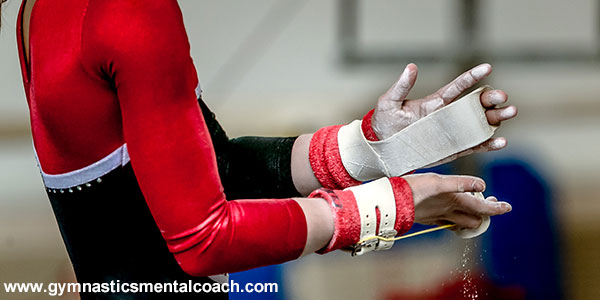Your Mindset for Gymnastics Meets
Why are some gymnasts able to bounce back after a routine or competition while others have difficulty rebounding from bad performances?
Which type of gymnast are you?
Let’s explore the reasons why gymnasts respond in different ways after bad performances…
There are two types of mindsets a gymnast can adopt after a less-than-best competition: the “oh-no-remember-the last-time” mindset and the “go-get-it-next-time” mindset.
The “Oh-No-Remember-The Last-Time” Mindset:
- Is characterized by fragile confidence – One bad routine creates overwhelming doubt and causes confidence to nose-dive.
- Speaks in absolutes – This is the tendency to think in concrete, black and white terms, such as either, “I am a good gymnast,” or, “I am the worst gymnast.”
- Looks for the negative – Bad performances are seen as evidence of a lack of ability or declining skills.
- Over-Generalizes – Believes the past dictates the future… “Since this routine was bad, my next routine will probably be bad too.”
- Lacks the proper focus – This type of gymnast is focused on the past (ruminating about past mistakes) or the future, fearing bad results in upcoming routines.
The “Go-Get-It-Next-Time” mindset:
- Is characterized by stable confidence –This type of gymnast believes in their ability to bounce back.
- Sees the big picture – One bad performance is seen as just that… one bad performance.
- Looks for the positive – Bad performances are seen as feedback to help improve future performances.
- Focuses on the present – This type of gymnast is focused on what to do in the present, in both training and competition, that will help them perform at their peak.
The University of Utah women’s gymnastics team exemplifies the “go-get-it-next-time” mindset.
The Utes lost back-to-back meets against Cal Berkeley and University of Michigan by narrow margins heading into their last meet of the season. The end of the season is the time when you want to be at your best, especially as you gear up for the Pac-12 Championships.
With hopes of a national title, Utah co-head coach, Megan Marsden, put the losses into perspective and moved forward with preparations for achieving the team’s ultimate goal, a National Championship.
MARSDEN: “It’s not unusual to have a loss. If you look at our records over time we don’t have very many undefeated records. Tom (Farden) and I are not overly concerned. The losses happened to land back-to-back, which is a little unfortunate, but we didn’t have major problems. We have to re-address some things with our approach, but we are going to try and get back on track.”
The Utes’ mindset allows them to keep these losses in perspective:
- “It’s not unusual to have a loss.”
- “The losses happened to land back-to-back.” (Not indicative of a trend.)
- “We didn’t have major problems.”
- “Focus on the next meet.”
The “go-get-it-next-time” mindset puts you in the best mental state for bouncing back after a bad performance and achieving their objectives for the season.
Rebounding After a Bad Gymnastics Performance:
Bouncing back requires a “Go-Get-It-Next-Time” mindset.
Focus on what you want to happen. Visualize yourself performing your routine the way you want to perform it.
Learn and grow from your previous mistakes and experiences. Avoid self-pity and judgement about not performing to your standards.
Think about how you will get back on track instead of avoiding another poor performance. Sometimes it take small adjustments to improve your score in a big way!
To learn more strategies for staying confident after a bad performance, check out, “The Confident Gymnast”!
Related Articles:
- Are Your Working Harder in the Gym, But not Scoring Better?
- How Simone Biles Copes with Mistakes
- Preparing Mentally For Post-Season Meets
*Subscribe to The Sports Psychology Podcast on iTunes
*Subscribe to The Sports Psychology Podcast on Spotify
Learn Mental Game Secrets to Unstoppable Confidence in Gymnastics!

Are you ready to improve your mental toughness and perform with ultimate self-confidence in competition?
Check out The Confident Gymnast Program!
The Confident Gymnast Workbook Program was developed not only by Dr. Cohn, but with the assistance of former gymnast Olympian Wendy Bruce.
The Confident Gymnast is ideal for any competitive gymnast. But not only do gymnasts benefit from the program, coaches and parents do as well!
- Gymnasts: Get the mental edge by learning how to take control of their confidence, mentally prepare for competition, and preform with composure under pressure
- Parents: Help boost your athletes’ performance. Don’t let their mind hold them back any longer!
- Coaches: Boost your gymnasts’ confidence using simple, proven mental strategies.
- Mental Coaches: Learn a proven system for helping your athletes boost mental toughness.

